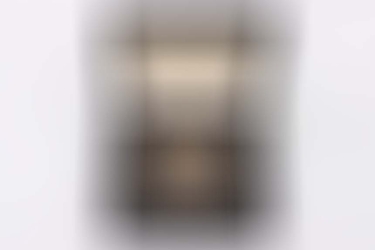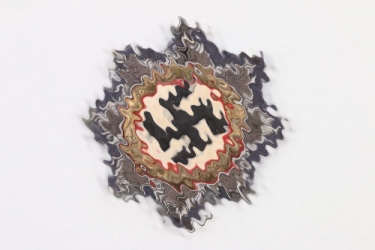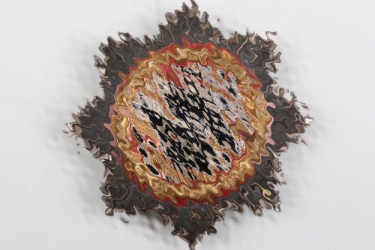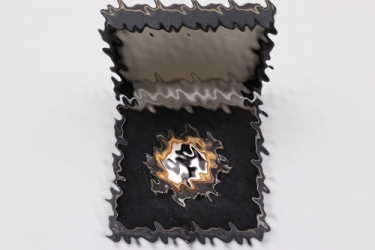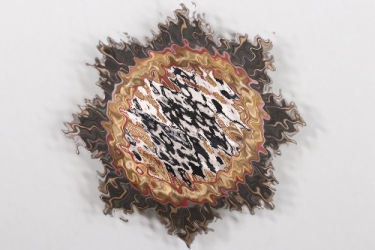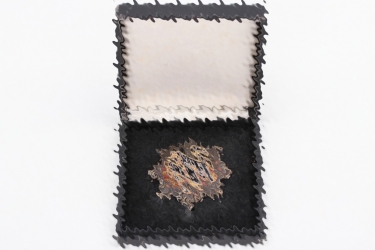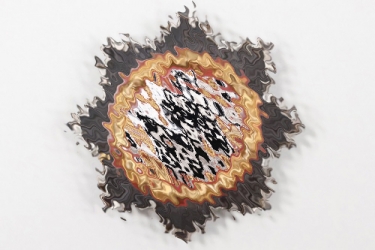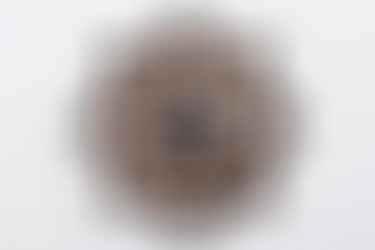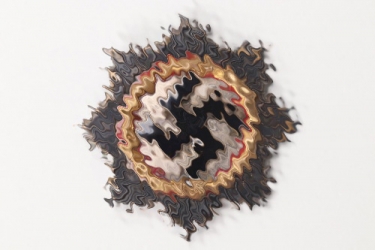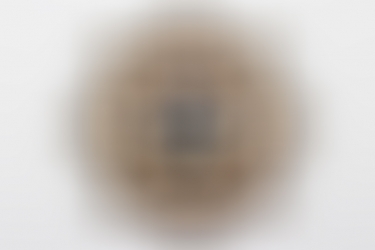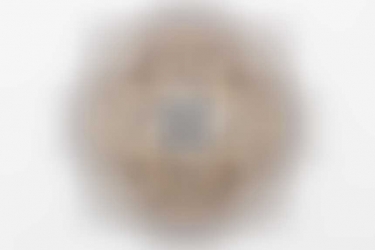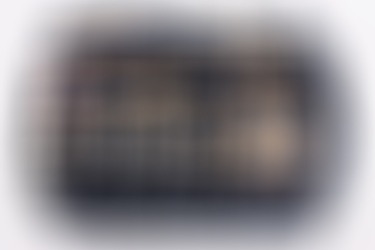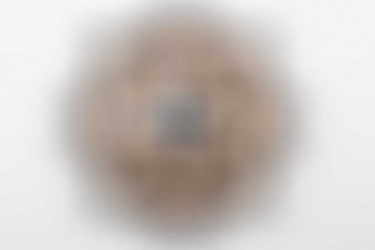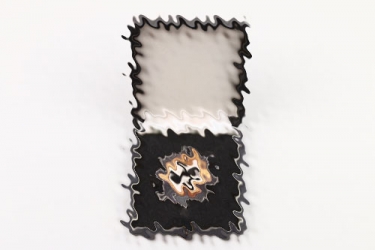German Cross in Gold
Militaria Price Guide
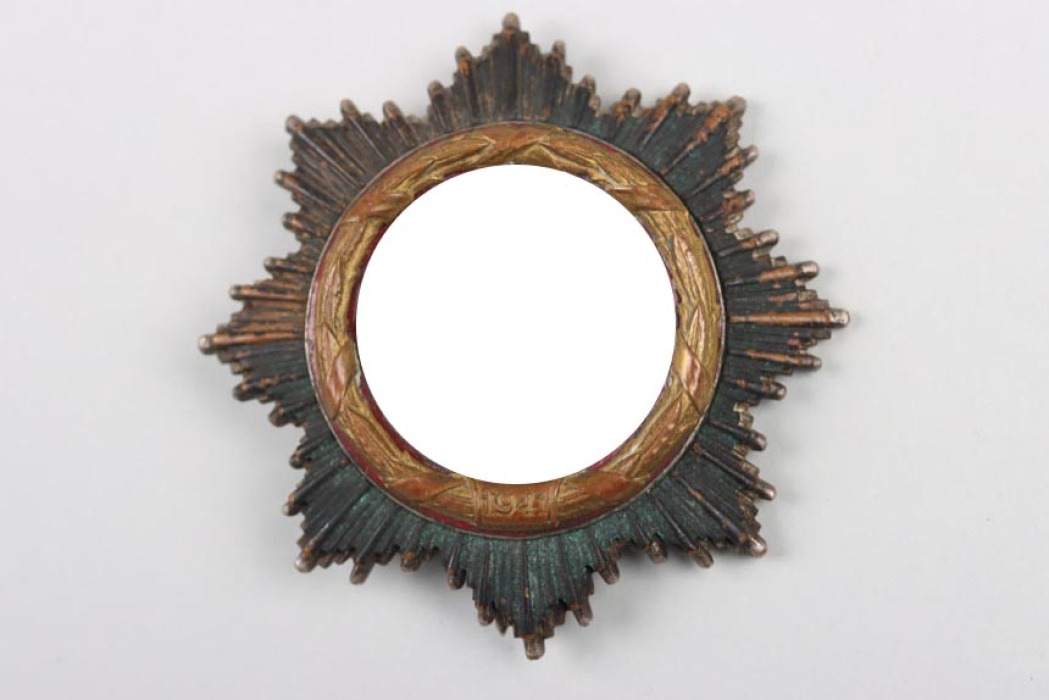
Regiment commander - German Cross in Gold (1, Deschler)
MILITARIA PRICE GUIDE
How can I see prices?
Welcome to the ratisbon's MILITARIA PRICE GUIDE!
To access all prices, pictures, and descriptions please subscribe to our MILITARIA PRICE GUIDE at www.ratisbons.com/militaria-price-guide. Save 25% when subscribing for one year! Get full access for just 75€!
We are buying single items and entire collections! Call +49 8541 9053699
-
PAYMENT
-
HOW CAN I PAY FOR MY ORDER?
AUCTIONSYou will receive an e-mail confirming your successful bids the day after the auction has ended. In your personal my ratisbon's you will be able to inform us about your most convenient payment method for this order or tell us about an alternative shipping address.
If we don’t hear from you within 24 hours, we will send an invoice choosing the payment and shipping options which we think are the most comfortable ones to you. If you decide to change your shipping or payment method after receiving your invoice, just drop us a line or visit my ratisbon's/ORDERS for any more details.
SHOP ORDERSChoose your payment method when ordering and submit your order. Once your order has been received we will send an invoice including your shipping costs and your payment instructions.
After receiving the invoice, the order must be paid within 7 days.
Please contact us to discuss layaway options.To learn more about paying at ratisbon's, please see your FAQ pages.
WE ACCEPT FOLLOWING PAYMENT METHODS
-
-
Versand
-
HOW DO YOU SHIP MY NEW TREASURES?
PACKING & TRACKINGWe usually send out orders within 1-3 working days after your payment has been received. In most cases, we are faster than this! We will inform you when your goods are being dispatched and provide a tracking number, In addition, you can always check your order status at my ratisbon's/ORDERS. Delivery times will vary depending upon the delivery destination and type of shipping service you have chosen.
SHIPPING TO ALTERNATIVE ADDRESSIf you prefer to have your order shipped to your work address or a friend during your absence, we will happy to arrange this for you. Send us an email letting us know about your new shipping address and we will be happy to send an updated invoice to you.
OUR LOGISTIC PARTNERS ARE AS FOLLOWS
-
-
OUR GUARANTEE
-
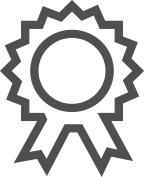 OUR GUARANTEE!
OUR GUARANTEE!We only offer collectables which to the best of our specialists knowledge are authentic. About 15% of all consignments are returned to the consignor after extensive research due to authenticity issues.
Unlike traditional auction houses we do offer a full right of return. If you are not satisfied with what you won or bought, you may return it within 14 days. Please inform us and we will instruct you on how to return the goods. For more information, please visit FAQ pages.
Important note: Cancelling bids after an auction may disappoint the consignor, who like you is a collector. This situation is easy to avoid. We encourage you not to bid on any collectable if you are unsure if it fits into your collection. Ask us to cancel your bid 24 hours prior to the end of an auction to avoid this situation.
-
COUNTRY Germany 1918 - 1945
DIMENSIONS
WEIGHT 71,2 g
EAN 2000000642635
PERIOD 1918 — 1945
COUNTRY Germany 1918 - 1945
COUNTRY Germany 1918 - 1945
LOT 57-0245
German Cross in Gold
Description
German Cross in gold made by Deschler, München. Collector's call this type a "heavy Deschler".
"1" maker marked to the reverse of the pin.
Great patina and truely worn in the field. Chipped enamel swastika mainly to the center due to extensive wear.
Type with 4 rivets.
Weight: 71,2 g
Condition
2-3
NAME
German Cross in Gold
DATE OF INSTITUTION
28. September 1941 as a military order in two grades. A special grade, the German Cross in Gold with Diamonds was planned and prototypes were made.
AWARD CRITERIA
The golden grade was awarded for multiple exceptional deeds of bravery or leadership and the silver grade for exceptional deeds in troop leadership. The award of the Iron Cross 1. Class, the Spange 1. Class , or the War Merit Cross 1. Class was a pre-requisite for the awarding of the German Cross. The German Cross was located above the Iron Cross 1. Class and War Merit Cross 1. Class but below the Knights Cross of the Iron Cross, respectively the Knights Cross of the War Merit Cross.
MANUFACTURERS
The German Cross was awarded by the decision of the supreme commanders of the three army branches.
The German Cross was produced by five known manufacturers and maybe one or two not yet known companies. The known manufacturers are Deschler & Sohn, who designed the cross, Gebrüder Godet, C.E. Juncker, C.F. Zimmermann, and Otto Klein.
Early crosses are unmarked and from the end of 1942/early 1943 onwards, the crosses were marked with the Präsidialkanzlei numbers of the companies.
Due to the heavy and slightly bulky nature of the award, a cloth version was authorized in June 1942. The cloth version can be found with eight different cloth backing colors: field gray (army), dark blue (navy), blue-gray (LW), black (tank forces), stone gray (assault gun), olive (Africa Heer), light khaki (Africa LW), and white (summer uniform).
AWARD NUMBERS
Accurate numbers are not known but the closest estimation based on surviving documents are 25,964 for the gold grade and 2,471 for the silver grade. A known total of eleven soldiers were awarded both grades.
The crosses were mainly stored and registered at the Präsidalkanzlei and were given out by this office. It is possible that smaller numbers were stored at the personnel offices of the three army branches.
AWARD DOCUMENTS
The Heer issued preliminary award documents in the format A5, followed by a larger (356 mm x 254 mm) formal document. The Luftwaffe and the Kriegsmarine never issued any preliminary documents, only the formal ones in the same size as the formal document of the Heer.
WEARING METHOD
The German Cross was worn at the right side of the uniform on the breast pocket.

